When it comes to Australia’s comic scene, some amazing things are happening out west – and few know that better than Campbell Whyte and Elizabeth Marruffo. They are two of the co-founders for the Perth Comics Art Festival (PCAF), which is an annual event dedicated to all levels of sequential storytelling that will enter its seventh year in 2024.
Whyte, who we spoke to recently, is a Perth native and cartoonist behind the Home Time graphic novels and the upcoming Luna Express. Meanwhile, Marruffo, who was born in Mexico and now resides in Perth, comes from a fine arts background, having worked as a sessional lecturer in painting at Edith Cowan University. She’s also currently working on Pup Pup Is the Boss of the Stars, a mixed-media graphic novel that combines traditional cartooning with needle-felt characters and handmade backgrounds.
Outside of PCAF, Whyte and Marruffo also run Milktooth, an art school where children can learn the techniques and processes for creating various types of visual arts, from comics-making to painting and textile work.
PCAF has grown bigger every year, becoming a focal point for the Perth comics scene and the wider country, with lineups that include some of the best cartoonists currently working in Australia. It might also be the coolest comic event in Australia – the festival’s market day takes place in the Western Australian Museum, where creators can sell their works while sitting under the skeleton of a blue whale.
I spoke with Marruffo and Whyte about the Western Australian comic scene and the increased visibility of comics being created across all levels, along with the importance of building, growing and nurturing a community.
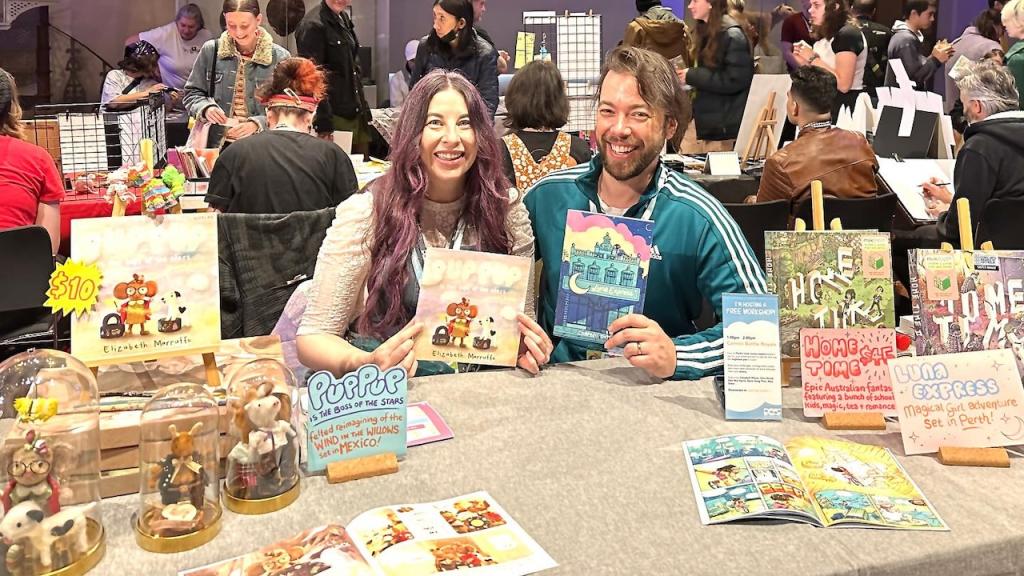
There’s the idea of wanting to get into comics, but there’s always that part of your brain that’s looking for permission, in some way. And then once you see other people doing it, it’s like, “Oh, well, they’re doing it. I can do it”. What’s the Perth scene like when it comes to comics? Is it a smaller, tight-knit group? Is it a bit more spread over the West Coast, or is it more based around the city centre?
Campbell Whyte: Western Australia itself is so enormous. It’s like half of the continent, almost. In Broome, there’s a great crew. Like Brenton McKenna; he was making comics almost by himself up there and spearheading the incredible Ubby’s Underdogs.
Elizabeth Marruffo: Twenty years ago, he had a very similar isolated and lonely experience to Campbell.
Campbell: Far more so, I would say. You’ve got Scott Wilson, who is from Broome as well, who has Kickstarted the Indigiverse, with The Dark Heart series with Gestalt. There’s Nathan Viney who’s down Walpole way.
Elizabeth: After these six years, we do know most people in Perth who want to be part of something. Some people don’t want to be, they want to be left alone to get on with it. And that’s fine. We kind of do know most people, but I think now it will be great to find and reach out to people in those more isolated regional areas that don’t have such easy access to the city. So there is a lot of privilege and being in the city and being close to everything and having those connections. But I think it would be great to be more sort of proactive in seeing who else is out there. So that people don’t feel like it’s an exclusive city-type of thing. Because I think that the strength of PCAF is the types of comics that are being made are so diverse.
Campbell: I think PCAF is a great way of bringing everyone together and celebrating all those different types of comics making. Once you start having different publications and outputs, which are regular or semi-regular annuals or something, you do get groups that are working within those. But there’s still a lot of cross-pollination between those groups. They’re not so isolationist or anything. Everyone’s kind of generally aware of what everyone else is doing [in Perth]. But then you still get really surprising things.
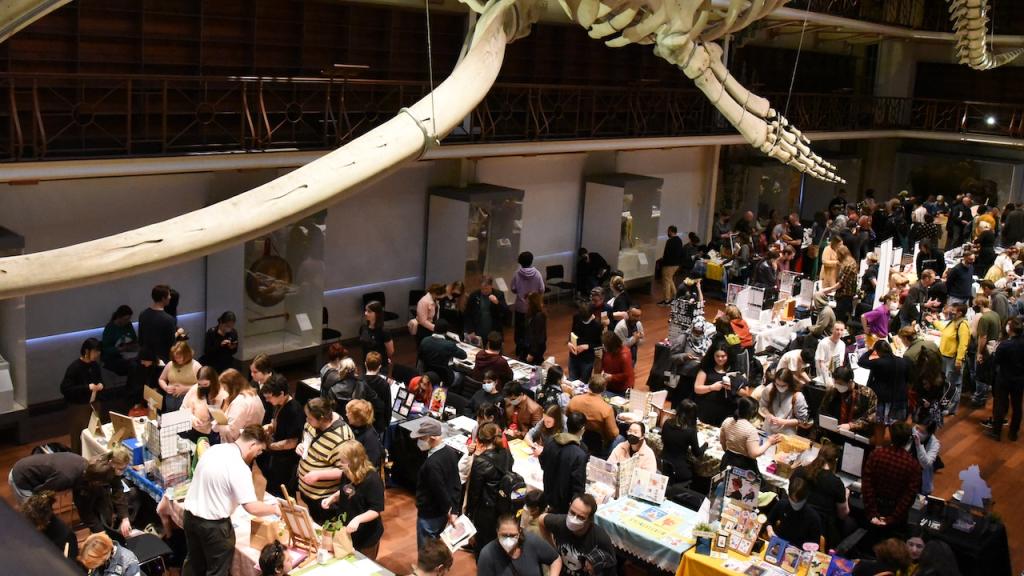
Elizabeth: Mostly everyone’s just really grateful to have somewhere they can be to meet like-minded people. I think that’s what makes it so successful because it’s very welcoming.
Campbell: That’s deliberately the kind of vibe for the Perth Comic Arts Festival and Milktooth. There’s an ethos that [Elizabeth] always brings up, which is this idea of art being ordinary. It’s everywhere and everyone’s capable of it. We deliberately try to make Milktooth and PCAF as accessible and welcoming as possible.
Elizabeth: That’s only made possible because of [MilkTooth], where we’ve built that up and we’ve got a really good rhythm of lots of enrollments. All these kids are coming to our classes and their parents are paying for that tuition. It’s basically the kids interested in art that are helping us then have the space available the rest of the time for illustration groups to meet, for comics makers to meet up and chat PCAF. It’s a very charming, relaxing and sweet space to be in that feels very nurturing as well.
One of the things that motivated us to do the festival was knowing that we were teaching all these kids all these skills, but then what? “Thank you so much. Thanks for your money. See you later”, would be one way to do it. But then it’s like, no, what can these kids who want to keep going, where can they start learning how to table, how to talk to people, how to spruik their comics, all that kind of stuff. So we’re slowly doing that. Hopefully, next year, it can grow and we’ll have more tabling dedicated to those first-timers.
Campbell: This year at PCAF, we had the Milktooth table of kids’ works. And then another table featuring works from a high-school comics club that was being taught by L.G. Veldenmire and Scott Higginbotham, who are the creators of the Webtoon series Solid State.
So we’re getting more and more up-and-comers, and we’re making space for them, And that’s exciting. Because we have over 400 comic students a year come through Milktooth. And even if like 10 per cent of those go on to make another comic as young adults, that’s hugely increasing the number of comics.
Elizabeth: And that will lead to other things. Maybe there’s an idea there that someone can make a film from, or an animation or a video game.
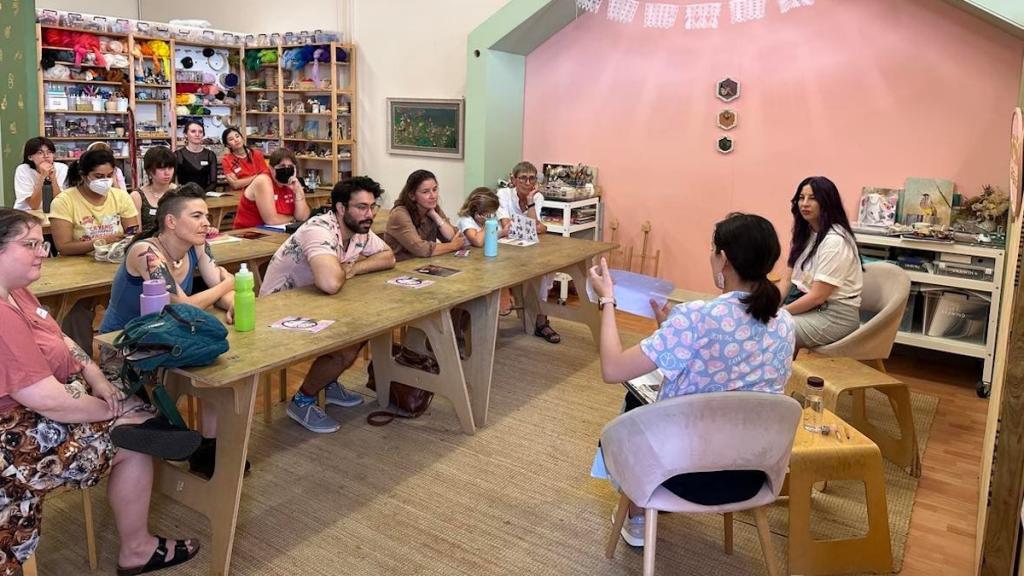
Is Milktooth just dedicated to comic art, or do you move around to other mediums as well?
Elizabeth: Campbell is the comics expert and I do all the painting, crafting, textiles – all of the other types of art stuff that I am obsessed with. That’s why my comic is made from textile, needle-felted little characters and painted backgrounds.
Campbell: But what’s exciting is, quite often, we’ll have students that will come and do my course for a few terms. And then they’ll go into Liz’s for a few terms, or vice versa. We’re working in the same large studio together, with classes simultaneously. And so there’ll be kids watching and saying, “Oh, what the other class is doing looks really fun. I’ll do that next term”. It’s really exciting when we get each other students because they bring different skills. Sometimes you have students who come in and do things in my comics class that I’m like, “I’ve never seen anyone do this”. But I know it’s because they just did the previous term with [Elizabeth] and they’d learned some skill. I think there’s so much potential there for those kinds of traditional or contemporary art ways of working or thinking, to bring those into comics, and vice versa. So much untapped potential for the medium.
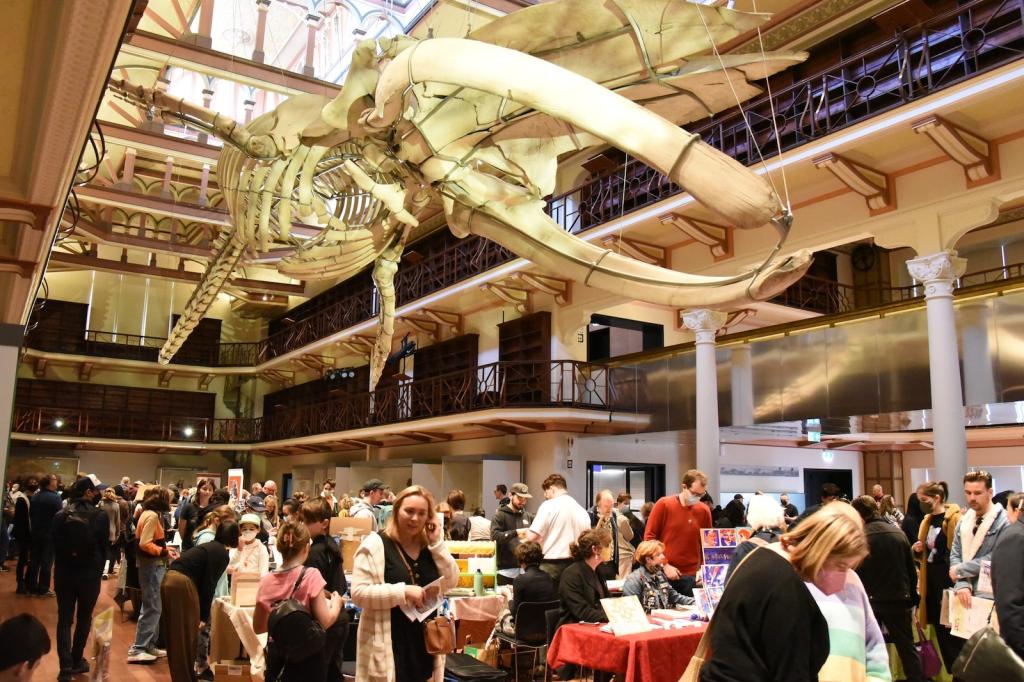
Yeah, totally. If you’re just looking at comics when making comics, it’s a narrow view, but once you spread out and absorb all these different forms, like art and movies, it gives you a broader skill set and different ways of thinking. With the comic Perth Comics Art Festival, that’s been running since 2019?
Campbell: 2018 was our first year.
How have you seen it change and grow? I feel like in the last decade, we’ve seen a really big change where more traditional publications and spaces are now looking at comics as more of a “respectable” art form. It’s an undervalued art form in an already undervalued art scene in Australia. How have you seen that kind of reception change as well?
Elizabeth: One of the things that really turned the switch on in my head was an exhibition that the Art Gallery of WA had here, curated by Robert Cook, and it was called Comic Tragics. He was able to select his favourite comics makers from around the world and the exhibition was incredible. I think it was one of their most well-attended shows, and it was the one that really spoke to me the most after having lost a lot of interest in that space and being a little bit burnt out by that whole industry.
Campbell: There are more Australian publishers starting to publish works, and there are precious few opportunities. It’s slow and steady, and we’re seeing a lot of what I think are sort of safe bets that they’re making. So you have someone like Allen & Unwin, who, they’ve always done quite big risk comics, “We know, this isn’t necessarily going to be a commercial success, but we believe the literary quality of this”. And they’re starting to branch out a bit more looking at the commercial opportunities. I can see that some comics makers locally are thinking more along those lines, where it’s like, “Oh, maybe I can make a work that will be in a bookstore and can sell”. So seeing the possibility of that, I think is kind of wonderful.
Elizabeth: Perth, though, I do think that, from what I can gather, that is quite a lot more. Maybe an over-representation at things like the Comic Art Workshop, in terms of submissions. People finish things because there’s that deadline. There’s more for sure, because of the festival. I know I finished things because of that deadline, and to be accountable to my friends.
Campbell: The festival definitely achieved one of its aims, which is generating more work and incentivizing the creation of new work. So we have the Tale Town anthology that comes out every year. West Coast Anthology, which Neighbourhood Press put out two years in a row. The Illustration Club do their annual scroll comic every year, which is a big anthology.
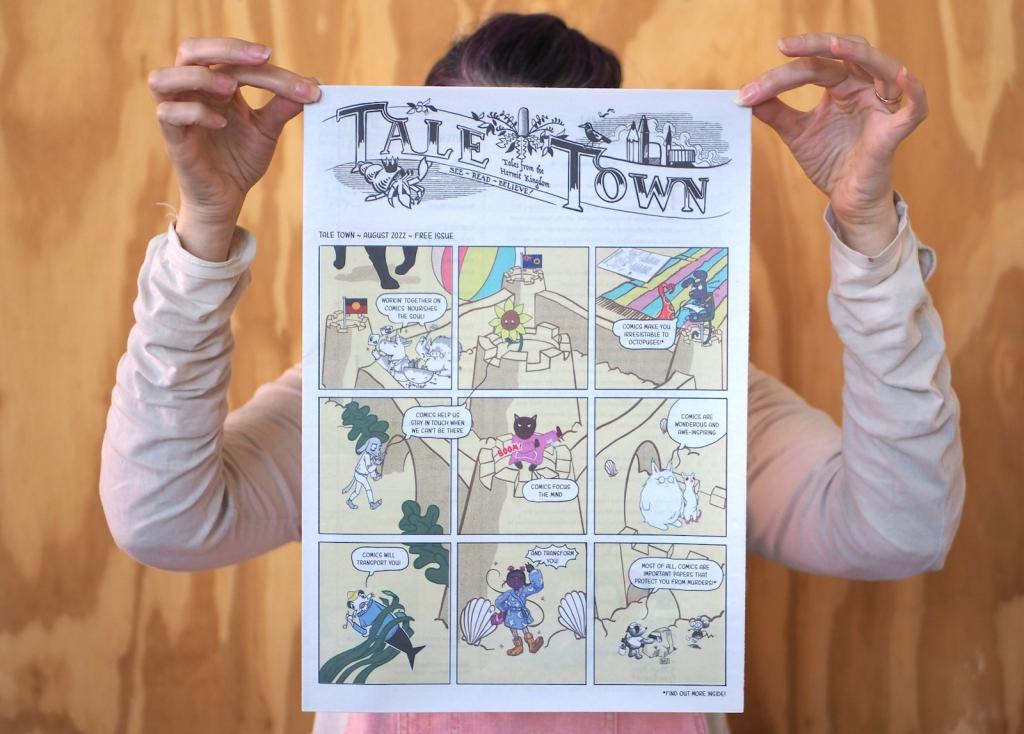
Elizabeth: People say to us that it’s motivating – “It’s motivated me to finish this”, or “I am inspired to keep going”. Often it’s really hard to keep going when it honestly feels like nobody is interested in what you’re doing. There are between 1500 to 2000 people that come to the festival, and they are all super keen, they’re all interested, they’re all blown away by everyone’s talent, and that feels good for the people tabling. It’s an immediate reflection of the work that I’ve done, and people make a lot of money as well.
Campbell: The experience of going to PCAF now is that you can see work being produced at all levels. So you can see work that’s little handprinted zines, and then there’s work that like “Yeah, I printed 100 copies of this at my local printer” – and they’re really high-quality publications, but they’re self-published. And then this is through a local publisher, like Gestalt, or this is through a national publisher, like Allen & Unwin or Penguin Random House, or then this is an international publisher, like First Second. You’re seeing local folk who are showing up with work across that entire spectrum. It’s that cheesy thing of “you can’t be what you can’t see”.
Elizabeth: And the professional development that happens in quite incidental ways as well. The mystery of how things work slowly dissipates. And heaps of people from over east keep coming to Perth for this thing, and it feels really cool.
Campbell: There’s definitely a consolidation and an acceleration of industry knowledge and professional knowledge, which is really wonderful. People are very open and happy to share that.
Elizabeth: PCAF for this past year have been doing monthly academy days at the State Library [of Western Australia]. Sarah Winifred Searle has been spearheading that as well as Aśka. This year we saw really clearly the work that had been done every month in that Academy appear at the festival, and they were some of my favourite pieces.
Campbell: There’s a lot of nurturing going on. And I think for us, we want something for our students to go to. That’s one motivator. It’s that long-term thinking. While perhaps a generation previously, you could tick that there were comics makers that came from Perth and they were working on an international stage. But personally, you might never have met them, you might never have even realised they were from Perth.
I think that it’s great to tick a box and say, “Yes, on Wikipedia that person says they’re from Perth”. But is there a legacy there? Is there a community? Is there a communal impact that can be left, and that continues to work and benefit others? I think that’s really what PCAF is focused on. It’s like a transformation of the whole medium here.
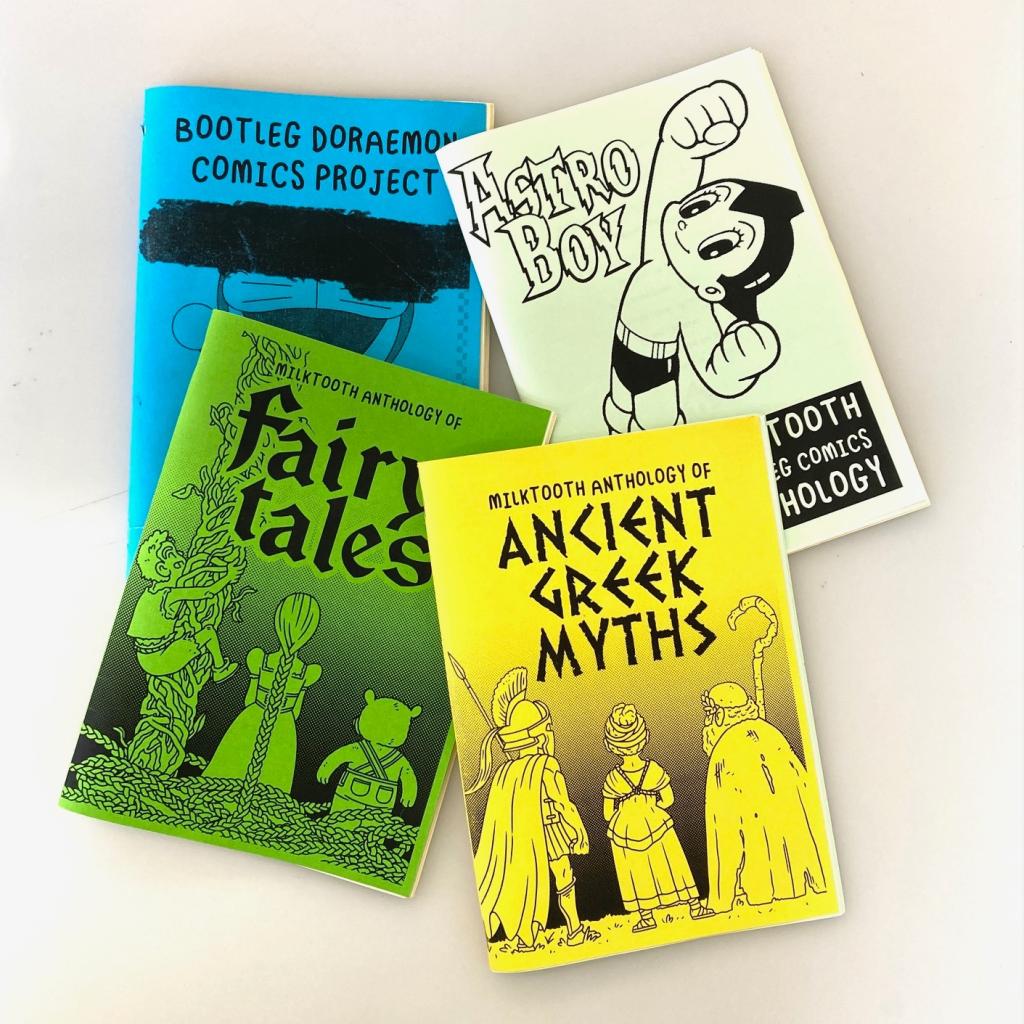
With actually being able to see the work being produced and that the rising tide lifts all boats. Especially with social media, there’s less of a barricade. It all exists on the same platform, so it’s all just comics. I’m over here and I’m aware of a bunch of people working over there, in places I’ve never visited, but I can see that work being produced.
Campbell: Yeah, I think that’s interesting. One of our market hall team members commented how they loved someone’s work on Instagram and Twitter and following them for a while. And then I think they had all the market hall applications come in for tablers, and they saw that person’s name. They’ve been following them for like, two years or something and never realised they were from Perth.
These geographical barriers can kind of disappear, which is a wonderful thing, I think. But the flip side of that is there’s something really beautiful about people physically coming together and being in spaces and occupying spaces, and energising each other in that way. Because I think the flip side of the barrierlessness or the borderlessness is that you’re then also kind of comparing yourself to all sorts of people in situations where you don’t actually have a full context of it. Online, I feel like all the cream rises to the surface. So you’re just seeing the apex of everyone’s careers, and it can be really disorienting.
That’s always the social media thing, right? The persona you put out there is always your best, you never see the warts or the uglier parts of the process. It’s always the final finished product.
Elizabeth: It makes you think, “Oh, it must be easy for everybody”. But when you actually know people, then you realise how hard they work or what they’re sacrificing. It makes you think the work is even more amazing, for a different reason.
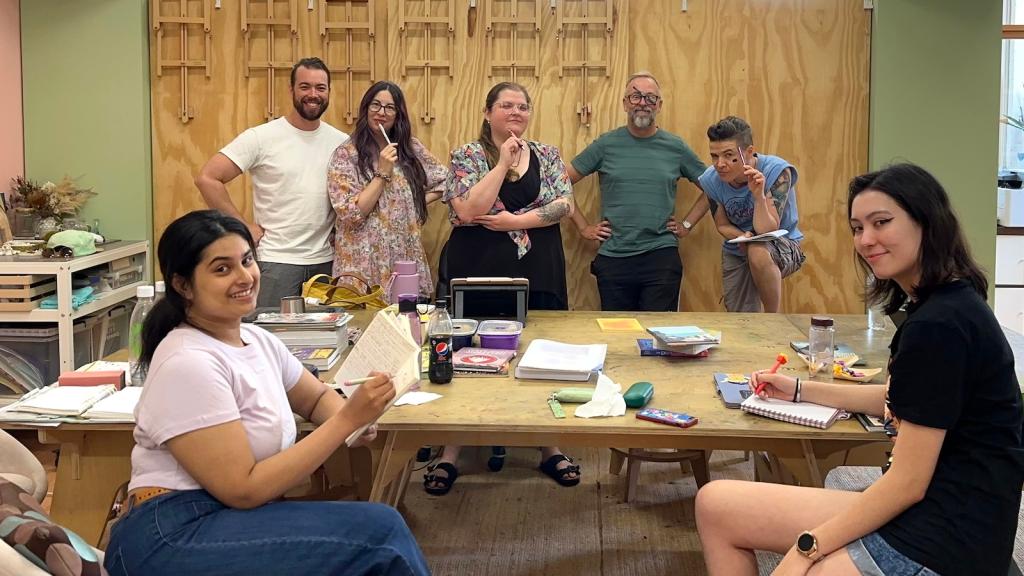
What do you want to see happen within the local level of Perth comics scene, and the broader Australian comic scene? What do you want to see it grow into?
Elizabeth: For the festival, we really do have a very clear five-year plan. What we’re trying to do is model it off the Toronto Comic Arts Festival, and have the [State] Library as a dedicated home for it. Which then means that there are professionals who will be doing a lot of the work that we’re just trying to do in a scrappy way.
In terms of exhibitions, there’ll be dedicated people to do that. And they’ve already said that they are actively filling that hole in their collection that doesn’t have any original comics or graphic novel work. So already, we are going to be having more comics makers in collections that will be archived historically. And they’ll be there forever for people to see what was happening at the time.
Campbell: I think that also ties into education as well, where we’re seeing comics in the classrooms a lot more. So I think the Perth Comic Arts Festival is looking to be a bigger part of that in the coming years. Because I think educators and book publishers have latched on to this notion that comics are great for reluctant readers, which I think is a lovely gateway. But I also worry that it’s like a bit of a cap for comics as well, where it’s like they’re training wheels for reading. And then once you can read, you don’t need them anymore. So I think I’m always wary of that.
On a national level, I think what we’re starting to see is exciting. It’s what I’ve been wanting for a long time, which is commercial publishing houses are starting to take on comics and release them. I just want to see more opportunities; more, more, more.
The Perth Comic Arts Festival will be returning in 2024, on Saturday, July 27 and Sunday, July 28. You can read more about Milktooth School of Art and Stories here.
Image: Provided / Campbell Whyte and Elizabeth Marruffo
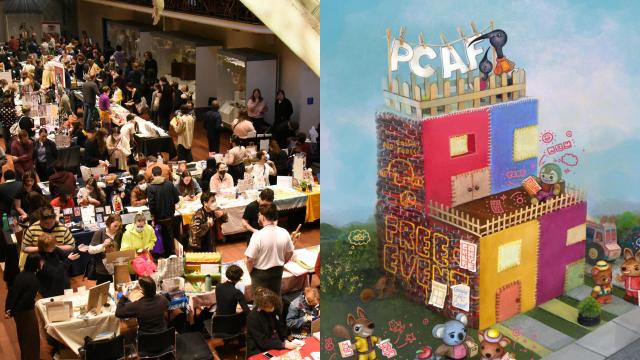
Leave a Reply